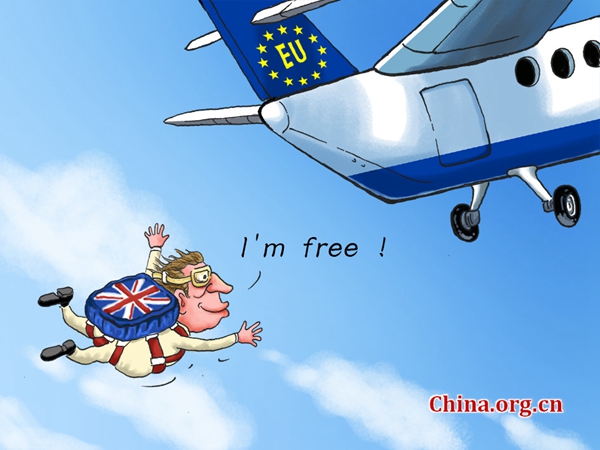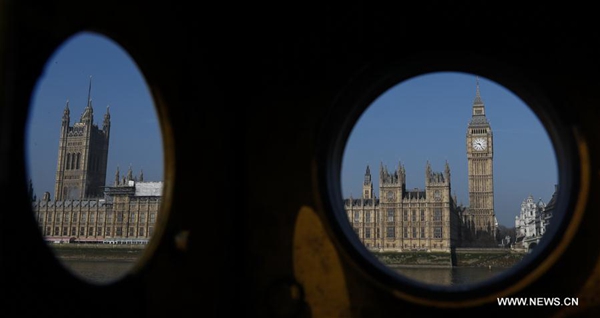Misunderstandings of globalization
china.org.cn / chinagate.cn by Christopher Georgiou, March 30, 2017 Adjust font size:
|
|
|
Brexit [By Zhai Haijun / China.org.cn] |
The merits of globalization are a hot topic in the contemporary environment. Many people allude to a backlash against globalization, and suggest the spark of the fire was the monumental events of Brexit and the election of President Trump in the U.S.
While the U.K. and the U.S. share a common official language, their political background and agendas should not also be painted with the same brush.
While the policy agenda of President Trump is somewhat of a moving target, there are certainly elements of anti-globalization in it, which are awaiting potential manifestation from the rhetoric. However the British position and Brexit should not be considered as anti-globalization - if anything it is the opposite.
Categorizing Brexit as anti-globalization is based on a misunderstanding of British politics. According to the World Bank, in 2015, the U.K.'s total value of trade was 56 percent of its GDP. The 2017 Heritage Foundation also placed the U.K. in 12th position in its 2017 global ranking of economic freedom.
The U.K. has a long history of free-trading, open ports and many other fundamental tenets of "globalization." It has spread the English language and rule of law to all corners of the world, and has a large ethnic population from all four corners of the world. The capital, London, is the most cosmopolitan city in the world in terms of language and culture. Thousands of international students study in the U.K. and millions of foreigners live and work there.
Global trade, investment and migration are crucial to the U.K. economy. After Brexit, the U.K. will continue to seek global partnerships. Most notably, the U.K. is currently enjoying a "golden era" of relations with China, and is cooperating with China on innumerous initiatives. The U.K. is a permanent member of the UN Security Council, a member of NATO, the World Bank, WTO and many other international organizations.
The fundamental mistake some analysts make is failing to distinguish between globalization vs. regionalization and globalization vs. political union.
In an ideal world for the U.K., she has aspired for free trade with the EU, as is the current case. But the U.K. did not necessarily want to lose its own sovereignty and freedom to decide on legal issues and immigration policies. The EU negotiating position has long been that access to the Single EU Market (free trade) must be associated with the free movement of labor.
Due to various social and economic factors, the U.K. is a very popular place to work and has a consistently high net inward migration level year-on-year - something which many in the general public were concerned about. Being in the EU, did not allow the U.K. to control its European borders. Moreover the increasing power of the EU political institutions such as the European Courts and Parliaments relative to national institutions made many U.K. citizens feel uncomfortable over the lack of national sovereignty.
|
|
|
Photo taken on March 28, 2017 shows the Houses of Parliament in London, Britain. Britain will trigger its exit from the European Union on March 29, nine months after the country voted to leave the European Union. (Xinhua/Han Yan) |
The U.K. will not now step back from the world stage, but will seek to forge new global partnerships and free trade agreements. Some countries touted to be on the top of the list include Australia, New Zealand, India and China. The U.K. will not seek to withdraw from the global institutions listed above that it is a member of. U.K. companies will not seek to withdraw from the world - in fact; conversely, they must be more aggressive now in finding new global opportunities outside of the EU.
Engaging in global politics and signing free trade deals, however, does not necessarily entail handing over sovereignty to other parliaments or having an open border, as is the case in the EU.
That is not the divine standard of globalization.
In terms of Trump's election campaign, there was a lot of rhetoric directed at America's lower and middle-class citizens who are facing hardships and struggling to keep up with the pace of economic and social transformation, both domestically and globally.
It is easy for Trump to blame globalization and unpatriotic national leaders. However, for people to worry that the U.S. will suddenly retreat from the world stage completely is unrealistic. American companies, institutions, brands, culture, banks and of course military forces are so ingrained in the global system, that they cannot just retreat, even if the President wanted them to. A President who himself formally built a global business empire in his name.
There is nothing intrinsically wrong with a national leader trying to bring back as many jobs as he can, and genuinely trying to improve the job prospects of its citizens. In fact, that should be the duty of any national leader.
Nevertheless, going against globalization is like swimming against the tide, especially for global nations like the U.S. and the U.K.
Even if the U.S. was to slightly swim against the tide, it is not necessarily such a bad thing. It has spent trillions of dollars on global wars in the last few decades, while at home it has areas with high poverty rates, failing schools and a difficulty to afford healthcare system.
It is an error to think that the U.S. or the U.K. can retreat majorly from globalization. If the U.S. does slightly slow down its pace of globalization and focus on cleaning up its own house, it is also an opportunity for others.
China for one, as a globally responsible superpower, can build new partnerships and friendships based on mutual trust and benefit. There is not only one brand of globalization for this world.
Opinion articles reflect the views of their authors only, not necessarily those of China.org.cn.

